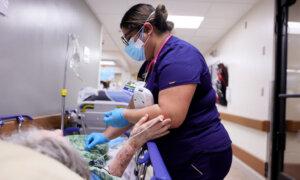A Senate hearing Thursday highlighted the runaway debt crushing American families.
“The reality of the situation and the related anxiety began when we received a bill that totaled upwards of $25,000 within the babies’ first month of life,” she said, adding that one of the infants remained in the hospital for six months. “We had health insurance coverage through my employer, but … we were still responsible for a significant portion of their medical care.”
As calls from debt collectors persisted—and the bill ultimately exceeded $80,000—the couple contemplated moving in with their parents and worried about whether they would ever qualify for a mortgage. Ms. Ward began working a second job to help pay the bills, which piled up as her babies needed additional treatment.
At the hearing of the Senate’s Committee on Health, Education, Labor, and Pension, Chairman Sen. Bernie Sanders (I-Vt.) said America’s health care system is dysfunctional and suggested Medicare for everyone as a solution.
Several witnesses struggling with medical debt testified at the hearing. It was confirmed that all witnesses accrued their medical debts from nonprofit hospitals, which are federally subsidized.
Federal Subsidies Not Passed on to Patients
Sen. Bill Cassidy (R-La.), a physician who worked for over 25 years in the Louisiana charity hospital system, said hospitals are responsible for more than half of medical debt.
“Congress has long provided additional resources in support of hospitals to help cover the cost of a patient who may otherwise be unable to pay,” Mr. Cassidy said, adding that there are many federal programs to help financially distressed hospitals. “They should be able to continue to be helpful to those who are unable to pay.”
“Hospitals participating in 340B get substantial discounts on prescription and oncology drugs, but it is unclear if these discounts are actually being passed to patients,” said Mr. Cassidy, adding that this is an important topic to consider to address a root cause. “If we just put up one more program, which is poorly implemented, we’re going to be back in this hearing five years from now.”
During the hearing, Ms. Ward and other witnesses complaining about burdensome medical debts affirmed that the hospitals where they or their loved ones were treated were designated as nonprofit with 340B subsidies.
Sen. Ted Budd (R-N.C.) asked Benedic Ippolito, a senior fellow at the American Enterprise Institute, what was being done to ensure that 340B savings were being passed on to those who need it most.
“My understanding is that there is almost no verification of what you do with 340B money at this point,” Mr. Ippolito said, adding that it would not be too complicated to set up a system to monitor the distribution of those funds as a way to encourage transparency and reduce medical debt.
Unclear Solutions to Medical Debt
Mr. Sanders told stories about medical debt, which he said had been sent in from all over the country in response to a social media post from his office.
“The leading cause of personal bankruptcy in this country is the outrageously high prices of large hospitals, and the pharmaceutical companies and insurance companies charge the American people for the crime of getting sick,” said Mr. Sanders.
“We need to transform our entire health care system, move to Medicare for all,” he said.
However, Mr. Cassidy argued that Medicare for all is not feasible.
“A health care system in which you think it’s free because the taxpayer is footing the bill—you’ve never seen how expensive something can be until you perceive that it is free,” he said in his opening remarks.
The meeting did not discuss Medicare for all as a solution. Proffered solutions to medical debt were mostly related to lowering health care prices rather than a wholesale system change.
Mr. Cassidy said medical debt is a symptom of a larger problem: the high cost of health care.
“Right now, Americans pay more for health insurance than ever before,” he said. He explained that the average monthly premiums for the unsubsidized insured on Affordable Health Care Silver plans are $483 for a 40-year-old, $1,600 for a family of four, and the average deductible is $5,000. “This kind of coverage is oftentimes unaffordable, and this is what can lead to medical debt.”
Layoffs Due to High Health Costs
On the same day, the Senate’s Special Committee on Aging also held a hearing with the expressed purpose of lowering health care costs and empowering patients.
Ranking Committee Member Mr. Braun, who also attended the hearing on medical debt, said health care costs have risen astronomically over the past few decades, rising to 18 percent of the gross domestic product.
Chris Deacon, a health care industry consultant, testified that companies are forced to give blank checks to health insurance companies that can “charge whatever they want, however they want, with little to no accountability or oversight.” Employers and unions responsible for purchasing health care for almost 160 million Americans face a lack of transparency.
She said government workers face layoffs and steep hikes in health insurance premiums due to increased health care costs. The Employee Retirement Income Security Act of 1974 (ERISA), the federal law that sets minimum standards for private industry health plans, is unfulfilled “when employees lack access to meaningful claims data and transparent information on the cost and quality of care,” Ms. Deacon told the committee.
Original News Source Link – Epoch Times
Running For Office? Conservative Campaign Consulting – Election Day Strategies!


